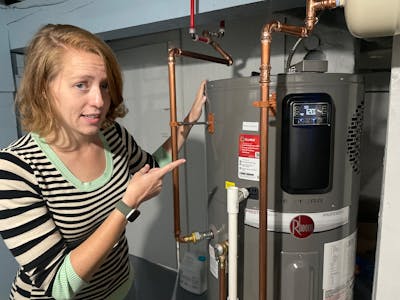EEco-conscious travelers feel guilty every time they board an airplane. They know that it's one of the most polluting things they can do. The travel industry knows this too, so airlines and some travel websites have made it easy to feel like you're mitigating all that burned jet fuel by buying something called a carbon offset.
Those offsets hold the promise of easing the environmental harm of flying by funding emission-reduction programs elsewhere in the world, such as wind farms, forest preservation and mangrove restoration.
It sounds simple, but the turbulent course of carbon offsets in recent years reveals that many travelers should think twice before buying them.
Consumers typically book carbon offsets through airlines, online travel websites, and directly through companies that offer the service by paying a fee similar to adding an extra bag or upgrading your seat assignment. The farther you fly, the more it costs.
Delta Air Lines, the dominant carrier at Minneapolis-St. Paul International Airport, no longer offers passengers the option of buying carbon offsets when booking a flight. Sun Country Airlines, the No. 2 carrier at MSP, doesn't have a carbon offset program, although other airlines serving the airport, such as Southwest, sell carbon offsets through Chooose, a Norwegian company.
YOUR CARBON FOOTPRINT
On this Earth Day, the Star Tribune offers a guide to the many ways you can take action today to reduce your carbon footprint.
Say you want to book a flight from MSP to Las Vegas in mid-May using Google Flights. The search will tell you the average number of kilos of carbon dioxide from the flight (176), and give you the option of choosing an airline and flight with fewer emissions. Or, you can try websites like trip.com that connect you to Chooose to book the offsets.
If purchasing carbon offsets directly through a standalone organization, consumer experts advise using those that support projects that meet third-party validation and verification standards, such as the Gold Standard.
But linking the offset money from your flight to actual projects across the globe can be elusive. So much so that a reporter with the New York Times' Wirecutter consumer website recently wrote that he couldn't recommend any air-travel carbon offset programs to readers.
The challenge to reduce carbon emissions in aviation is daunting. U.S. airlines transport more than 2 million passengers and 65,000 tons of cargo a day, which adds up to about 2% of the nation's greenhouse gas emissions, said Marli Collier, a spokesperson for the trade group Airlines for America. The industry made a commitment three years ago to achieve net-zero carbon emissions by 2050.
Delta opted to move away from carbon offsets to focus on decarbonizing the airline by investing in a broader strategy that includes developing sustainable aviation fuel, deploying a more fuel-efficient fleet, and reducing emissions through "operational efficiencies," such as electrifying baggage carts and other vehicles and using paper cups instead of plastic, said Mathew Lasky, a spokesman for the Atlanta-based airline.
Delta is being sued in federal court by several California residents who allege greenwashing, a marketing tactic where a company makes deceptive claims about its environmental friendliness. The suit claims the unreliable carbon offset market makes Delta's environmental claims false and misleading. Delta has said the suit lacks legal merit, and some of the claims were dismissed in early April.
Kyle Potter, executive editor of the Thrifty Traveler website, said carbon offsets are a way for airlines "to pretend they're doing something to counter aviation's carbon footprint," but he said questions remain whether that goal is actually being realized.
"There were good carbon offset programs, but far too many bad ones," he said. "If they've fallen out of favor, that's no surprise."
On the flip side, Potter says the availability of offsets in recent years "undoubtedly played an important role in actually increasing the public awareness about the environmental cost of getting on a plane — and forced us all to consider far better alternatives."
So if you really want to reduce your carbon footprint for traveling, here are a few suggestions: Fly less. Avoid flying to nearby destinations; instead, drive with more than one person, and preferably in an electric or hybrid vehicle. Better yet, take the train. Book nonstop flights, because they use less fuel. Fly in economy class, and pack light.











